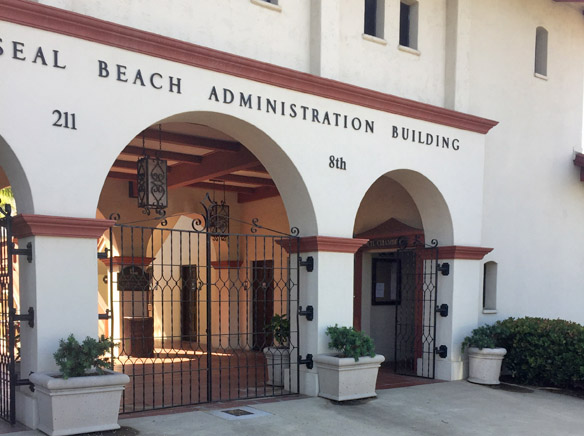The city manager told the council last week that the proposed budget is balanced.
“I don’t in any way even say that lightly,” said City Manager Jill Ingram at a special Thursday, June 2, Seal Beach City Council budget workshop.
Ingram told the council that staff had made significant budget cuts to bring them a balanced budget.
She told the council that early in the process, when staff took the initial look at the initial draft budget, they were looking at $4.7 million deficit.
Ingram said that was because revenues are not increasing pace to keep up with increasing costs.
Ingram told the council it took staff hours to bridge the gap to come up with a balanced budget without impacting programs.
“Those expenditure reductions year after year are just not sustainable long term,” she said.
Ingram told the council that the city needs to talk about opportunities for new revenue sources no matter how controversial.
In a July 6 email, a reply to a question about how the
Ingram wrote: “It would be accurate to report that the City’s proposed FY 22-23 budget is balanced. However, once we include capital project expenditures, those projects will need to be paid for out of reserves. Capital project expenditures are one-time expenditures, and these types of expenditures are typically paid for out of reserves. Fortunately, primarily due to budgetary savings, we have been able to increase our reserves during the last two fiscal years.”
Near the end of the special meeting on the proposed 2022-23 budget, Ingram said: “We can’t continue to cut and optimize and still be able to provide the same level of programs and services.”
Ingram said it is not sustainable long term for the city to continue making cuts, especially when the majority of cuts is just deferring projects.
In related news, several College Park East residents called on the council to spend money on College Park East’s parks.
Readers should be warned there are a lot of numbers ahead. The City Council held the first of two special meetings to discuss the budget for the coming fiscal year last week. A second meeting on the city’s capital improvement program (basically construction and maintenance) was scheduled for 5:30 p.m., Tuesday, June 7.
Ingram said city staff worked countless hours to present a balanced budget without reducing services.
Interim Finance Director/Treasurer Sherry Johnson said city staff worked extremely hard to cut back. She said departments were told to prioritize needs over wants.
Johnson also said deferred maintenance needed to be addresses.
Per her slide presentation to the council, property tax revenues are projected to increase 2%.; Measure BB revenue (a 1 cent transaction tax on local sales) was expected to increase 13%.
Johnson told the council that overall expenses were budgeted at an increase of 10%.
She also told the council that General Fund revenue is budgeted to increase 8%.
According to her slide presentation, the budget included a 3% increase in base salaries for already-negotiated employee contracts. Potential changes for contracts that expire on June 30 were not included in the budget.
She told the council that police and fire services were the city’s largest expenses. (A pie chart in her presentation put the projected cost of police services at $14.9 million; fire services were put at $6.8 million.)
According to Johnson’s presentation: projected revenues for 2022-23 are $40,346,400; projected costs: $40,319,900.
Johnson named inflation among the challenges facing the city budget.
Staff recommended eliminating from the Community Development Department, a full-time building official, a full-time senior building inspector, a full-time senior building technician and increasing contract professional service.
For the Seal Beach Police Department, staff recommended adding two full-time senior community services officers, adding a part-time police aid, and reclassifying the lead CSO to police services manager.
Staff also recommended freezing a full-time accounting technician from the Finance Department and freezing a full-time recreation specialist from the Community Services Department.
Johnson also provided the council with staff’s final takeaways from the 2022-23 budget. (For the council’s takeaways, see page ???)
According to her presentation:
• Staff proposes using $2,594,000 from the General Fund to address items that were postponed (deferred) in prior years.
• No money is going to the Information Technology and Vehicle Replacement Funds.
• “Measure BB is now fully utilized as part of the operating budget, and we can anticipate ongoing small increases; the growth in this revenue source is not expected to grow at the rate of ongoing expenditures.”
• The city needs new revenue resources.
Potential sources of revenue that Johnson identified were:
• increasing the levy on the street lighting district
• metered parking in downtown Seal Beach.
• short term rentals
• considering the proposed change to the Old Ranch Country Club specific plan. (The Sun emailed questions about the proposal to project manager Ed Selich on May 4. None have been received as of June 6.)
• citing motorists for violating head-in parking.
• continue to review fees on a regular basis
• allowing cannabis businesses
Revenue discussions
During the question and answer period, District Five Councilwoman Sandra Massa-Lavitt asked what the savings would be in any department if Seal Beach hired a consultant rather than an in-house employee.
Community Development Director Alexa Smittle said it would depend on the cost of the contract. She said there would be about a 25% saving for a consultant planner. When it comes to building services, the difference would be minimal, according to Smittle.
City Manager Ingram, referring to hiring consultants, said the city might not have that area of expertise on staff. She also argued that hiring a consultant did not include the ongoing costs of hiring staff, such as funding pensions.
On the subject of short term rentals, Johnson said: “You definitely have short term rentals in this city, but you’re not collecting on them because you don’t have an ordinance.”
As for considering the Old Ranch Country Club proposal, Johnson said that hotels bring in a lot of money but she didn’t know what the plan is.
Johnson said cities are allowing cannabis businesses. She urged the council to discuss the issue. “That’s something to look at because cost cutting is painful,” she said.
“At the end of the day, residents don’t like it at all,” Johnson said.
She told the council staff could bring back more information about short term rentals.
Ingram said: “We’re already there—we can’t keep just talking about it,” apparently referring to revenue sources.
Ingram said short term rentals are limited and had sunset in Seal Beach.
Ingram said the California Coastal Commission is pushing cities for more visitor serving opportunities.
Massa-Lavitt asked how long it would take staff to consider these issues and bring the information back to the council.
Ingram said staff could bring the issues to a strategic planning meeting in the next few months.
Massa-Lavitt, referring to parking meters in downtown Seal Beach suggested the environment for that issue had changed.
District One Councilman/Mayor Joe Kalmick recalled when the parking meter issue was discussed years ago. He was a merchant at the time.
“Back then, I was very much opposed to it,” Kalmick said.
In those days, you fed quarters into the parking meters. His concern at the time, and that of other merchants, was that they would be doing business with a customer and someone would come in to ask for change.
Kalmick has since changed his mind.
“We already have metered parking on the side lots,” Kalmick said.
Police Chief Phil Gonshak said that parking meters are a thing of the past. According to Gonshak, cities are moving to parking stations.
According to Gonshak, parking stations allow the public to use their phones to pay for parking.
He said there are ways for residents who want to get coffee in the morning to not pay for parking.
According to Gonshak, estimates for parking revenue just on Main Street would be $300,000 to $1.3 million a year.
However, District Two Councilman Thomas Moore opposed paid parking in the downtown area.
“That’s one of the things Seal Beach is kind of known for; that you can come and park and not have to worry about parking,” Moore said.
District Four Councilwoman Schelly Sustarsic said she wouldn’t mind paying for parking. However, she was concerned that paid parking would push people into the residential neighborhoods.
“From my observations, that’s inevitable,” Kalmick said.
Gonshak said that, depending on the application, the city could make it so that residents get two hours of free parking.
Kalmick also discussed in lieu parking fees. He said in his opinion, the in lieu parking fees were basically extortion—charging for parking without providing parking.
“The money is sitting there,” he said.
Smittle confirmed that the city’s policy is to use the in lieu parking money for parking improvement projects.
Smittle said staff could bring the policy back to the council.
The second workshop, scheduled for Tuesday, June 7, would include the five-year forecast. Johnson said the budget was scheduled to be approved at the June 27 council meeting. “What happens if we don’t make it by July 1st,” Massa-Lavitt asked.
(The current fiscal year ends June 30. The next fiscal year starts July 1.)
“You can submit something to extend a budget,” Johnson said. “But I feel confident that we can get it done.”










